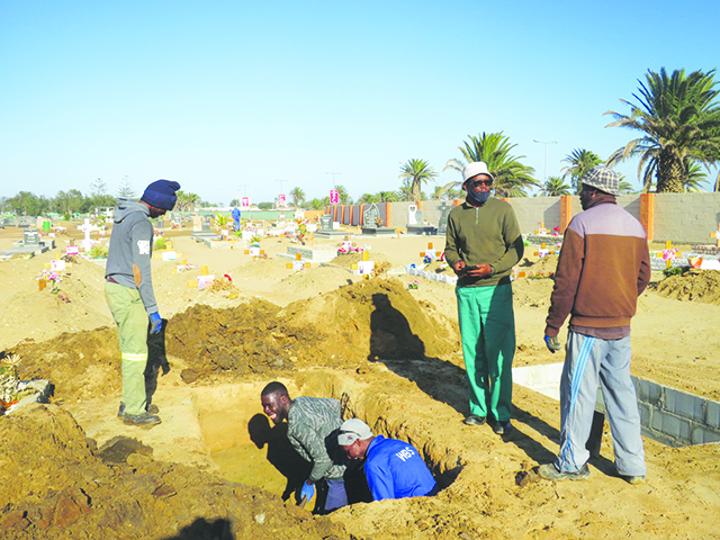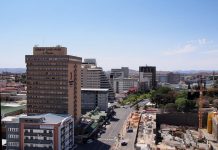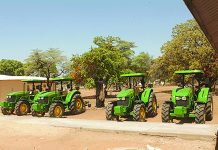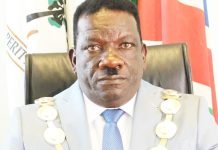Africa-Press – Namibia. IT IS SEVEN O’CLOCK in the morning and Mario, Tangeni, Erastus, and Kavu are racing against time to finish digging yet another grave. Equipped with only shovels and a pick, the four men have been responsible for digging graves at Walvis Bay’s three cemeteries since May.
This is just before the third wave of Covid-19 deaths hit Namibia. There is no time to take a break, because the undertaker’s bakkie has just pulled up to prepare the grave for a funeral set to be conducted at 11h00.
“It has been crazy since July. One day we dug 10 graves, driving from one cemetery to another. That day we had less than two hours per grave,” Tangeni says. On the same day the men had to dig a trench for the fire brigade’s water supply pipe in the cemetery after it was damaged by a pick.
Grave sizes vary from small to medium and large. The bigger the grave, the faster they have to dig, and it takes them two days to build a brick wall. This is to ensure the wall is dry on the burial date.
The four men refuse to provide The Namibian with their surnames, saying they are stigmatised for their job. “How do I tell my wife or children what I do for a living?” asks Mario, who survived on sport betting before getting a six-month contract from the municipality of Walvis Bay to dig graves.
The four diggers’ foreman, Fritz Tjikuniwa, says: “In our culture digging graves is not a career. I am not supposed to visit cemeteries on a daily basis. We say ‘kaku jarukua (no return)’. I don’t know what my ancestors will do. But I need to feed my family.”
CHALLENGES Digging graves at Walvis Bay is a challenge as the sand in the area often collapses, which means graves need to be constructed. The other challenge is that the town’s water table is shallow.
During the third wave of Covid-19 infections in Namibia workers had to dig graves from Monday to Monday, with few to no breaks in between, as funerals became a daily occurance.
Prior to this, they worked three to four days a week. From May to July this year, the municipality of Walvis Bay sold a total of 131 graves at its three cemeteries.
Lucky Shipanga, the supervisor of the municipality’s parks and cemeteries division, says he has been working twice as hard as usual to keep up with funerals at the town.
“I slept very little [during the peak]. I needed to be at the cemeteries to ensure everything was fine. We could not burden mourners with substandard work,” he says.
Shipanga says because of the pace at which they have been operating, he can now execute a funeral programme much faster. During The Namibian’s visit, he is constantly interrupted by phone calls.
One is from an undertaker booking three graves. “It is like this every day,” Shipanga says as he takes yet another call. His team faces many challenges. They have more work than their bodies can bear.
“Time and again one gets sick, then there are only three workers, which increases the pressure,” Shipanga says. STAYING MOTIVATED
Mario, Tangeni, Erastus, and Kavu say they have been digging graves throughout the third wave with not much recognition or appreciation from the public.
Shipanga and Tjikuniwa say they have been doing whatever they could to keep these men motivated, including buying them lunch at times, or picking up the shovels themselves to allow the men breaks.
‘”We work under extreme pressure. Sometimes you have just finished digging a grave, hoping to take a break, but then you get assigned more. We get little sleep as work starts very early in the morning,” Tjikuniwa says.
The International Labour Organisation has suggested that employers should consider improving work methods, since many workers’ workload has increased during the pandemic
This would include acquiring the necessary equipment and support to help workers complete their tasks safely and efficiently. The municipality of Walvis Bay has in July acquired a TLB backhoe loader to alleviate the pressure on the four grave diggers.
– This article was produced with support from the Open Society Initiative for Southern Africa Grant.






